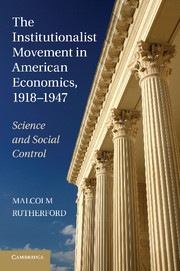Book contents
- Frontmatter
- Contents
- List of Tables
- Acknowledgments
- PART ONE INTRODUCTION
- PART TWO INSTITUTIONALIST CAREERS
- 3 Walton Hamilton
- 4 Morris A. Copeland
- PART THREE CENTERS OF INSTITUTIONAL ECONOMICS
- PART FOUR CHALLENGES AND CHANGES
- PART FIVE CONCLUSION
- Archive Collections Consulted
- References
- Index
- Titles in the series
3 - Walton Hamilton
Institutionalism and the Public Control of Business
Published online by Cambridge University Press: 03 May 2011
- Frontmatter
- Contents
- List of Tables
- Acknowledgments
- PART ONE INTRODUCTION
- PART TWO INSTITUTIONALIST CAREERS
- 3 Walton Hamilton
- 4 Morris A. Copeland
- PART THREE CENTERS OF INSTITUTIONAL ECONOMICS
- PART FOUR CHALLENGES AND CHANGES
- PART FIVE CONCLUSION
- Archive Collections Consulted
- References
- Index
- Titles in the series
Summary
As has already been argued, Walton Hamilton was one of the leading promoters, if not the leading promoter, of the institutionalist approach to economics at the time of the movement's formation. Despite this, Hamilton's career has been the subject of remarkably little commentary in the secondary literature (but see Dorfman 1974). The reason for this neglect can only be the subsequent focus on Veblen, Mitchell, and Commons. It certainly cannot be because Hamilton's career lacked importance for the institutionalist movement – quite the opposite is true. Hamilton's books on wages (Hamilton and May 1923) and the coal industry (Hamilton and Wright 1925) were frequently held up as models of institutional analysis at the time; his work on law and economics and on the regulation of business contributed greatly to one of the central themes of the institutionalist literature; he was much involved with the New Deal and with other reform efforts; and the programs of education he led at Amherst College and at the Brookings Graduate School were both innovative and trained a large number of young institutionalists (see Chapter 6). Some contemporary observers, such as Herbert Davenport, thought that it would be Hamilton, if anyone, who would provide a systematic statement of institutional economics.
HAMILTON'S CAREER IN OUTLINE
Walton Hamilton was born in 1881 in Hiwassee College, Tennessee, the son of an itinerant Methodist minister. He attended the Webb School in Bell Buckle, Tennessee, and between 1901 and 1903 he attended Vanderbilt University.
- Type
- Chapter
- Information
- The Institutionalist Movement in American Economics, 1918–1947Science and Social Control, pp. 57 - 95Publisher: Cambridge University PressPrint publication year: 2011

